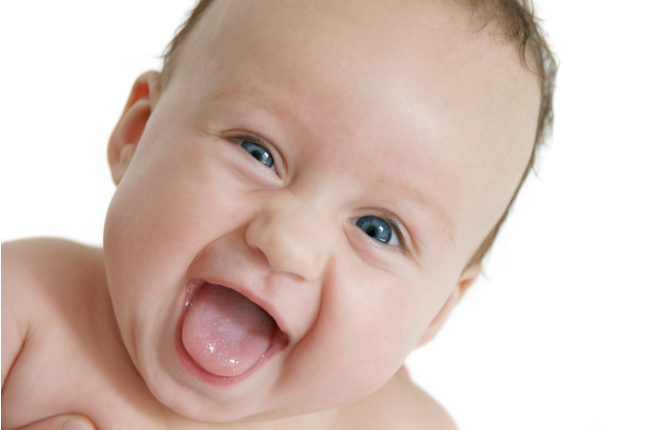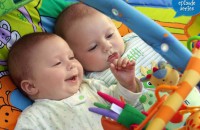Parent Savers
Speech Development in Toddlers
[00:00:00]
[Theme Music]
HOLLY GANGWER: Your child is happily content observing the world around them. They may not babble as an infant or their vocabulary seems behind compared to their peers – when is it not normal whether the milestones for Speech Development in your kids. Are there differences between boys and girls?
I’m Holly Gangwer, Speech Language Pathologist from K.I.D.S. Therapy Associates and this is Parent Savers Episode 30.
[Theme Music/Intro]
KC WILT: Welcome to Parent Savers broadcasting from the Birth Education Centre of San Diego. I am your host, KC Wilt. Parent Savers is all about helping new parents from the baby years to the toddler years. So, download the free app. Sign up for the free newsletter, like us on Facebook, send us an e-mail or call our hotline. This is your show. We want you to be involved. We have amazing experts at our fingertips – so, shoot us a line and we’ll get your questions answered.
We also have a new option of joining our Parent Savers Club that’s where you can download the archive episodes and get exclusive contents and so much more. So, I am a new parent myself. My son Carson is almost 23 months old. He’s almost to two’s. I have reset in a couple episodes before as I don’t know when I’m going to start saying months to two’s. Was it an easy transition Sunny?
SUNNY GAULT: Yes, actually I don’t really think I’ve made it to two years.
KC WILT: You just sit almost two.
SUNNY GAULT: Yes.
KC WILT: So, I guess he is a year and a half for almost two and I’m joined by two new parents in the studio.
SUNNY GAULT: Hi everyone. My name is Sunny Gault and I am the host and producer of our sister show, Preggy Pals which is all about pregnancy. I’m 34 years old. I have two children, both are boys. One is about six months old and another one is two years old. I really need this episode because he is a bit behind in the speech area and I have lots of questions for you.
JEN LONG: Hi, I’m Jen Long. I’m 32. I’m a stay-at-home mom. I have one little girl. She’s nine months old. I’m actually looking forward to this because she is quite a babbler. I’d like to see what’s coming next.
KC WILT: Our kids should get together and maybe rub off on [unclear].
SUNNY GAULT: That would be good.
[Theme Music]
KC WILT: Before we begin today’s show, here is Johner Riehl to tell us about some great apps for new parents.
JOHNER RIEHL: Hey Parent Savers, I’m Johner Riehl, founder of Family Friendly Video Games.com. I’m here to talk about helpful apps for new parents. Today, I want to talk to you about a great app called Bug Games from Busy Bees Studios. This was designed with toddlers in mind and it’s a great app because once toddlers are playing, there’s no links for them to click or places for them to exit the app or stations to buy anything else.
So, in Bug Games – there’s four different mini games that are themed on bugs or insects or flowers to focus on the areas of music, phonics, puzzles and counting. Our family’s favourite is the Music Wand where the little bugs line out and they’ll sing a song like London Bridge or Heart Cross Buns and they can hear you sing the whole song.
Our kids can tap them one at a time and they’ll sing like – Hot Cross Buns, Hot Cross Buns and if you don’t know those songs by heart you’ll definitely will after your kids play Bug Games a little bit. It’s a great app for toddlers.
Bug Games is $0.99. You can check it out and find a link to download it on this week’s episode page on www.parentsavers.com and make sure to listen to more episodes of Parent Savers for more great apps recommendations for new parents.
[Theme Music]
KC WILT: Today on Parent Savers, we have Holly Gangwer Speech Language Pathologist with K.I.D.S. Therapy Associates and she’s helping us learn about the normal development of speech with our babies and when we need to be concern. So, Holly what is the difference between Speech and Language development?
HOLLY GANGWER: Okay, that’s a really common question about a lot of parents have. But, basically speech is just the motor aspect of the verbal. It’s the verbal means of communicating. When we think about speech, we think of the out articulation and then we also look at the voice quality as well as fluency.
When we think about language development that encompasses:
• What words mean?
• Are they understanding the vocabulary?
• Are they able to put words together and then
• Are they able to use the language in social situations which we often refer to as pragmatics?
KC WILT: So, it’s kind of like, “They may understand. They may be able to repeat what you say but do they understand it?”
HOLLY GANGWER: Exactly.
KC WILT: That would be the language development aspect. A lot of kids especially from birth to six months, you’re going to have some language development kind of milestones but more so, the speech aspect of it – that’s when they’re going to really explore their babbling and kind of figuring out how their mouth moves and what sounds come out.
SUNNY GAULT: I have some questions when it comes to milestones because as I’ve mentioned in the intro. I have a two-year old who isn’t quite just two. I guess he’s two in a few months. I haven’t actually done the math. It’s a little early in the morning for me to do that.
But, I have started realizing in about 18 months when I took him in to see the paediatrician. At least from my paediatrician, there’s a form that they give you and they ask you all these different types of questions. One of which was, “How many words can your baby say?” I’m going through and I’m counting. I can’t even get to five and they’re telling me I have to have 15 or 20 or whatever it was.
So, in talking to the paediatrician – they recommended that my son go-see someone that is related to speech, I’m not sure if it was a pathologist or what the terminology was. But, I did go in. I brought my son. They examined him. It was a very comfortable kind of environment. They really just want him to play with toys. They were interacting with him that way. I don’t know. I guess I have these images of
JEN LONG: They flap flash cards.
SUNNY GAULT: Yes, it would be more strict or something. But, they basically said he really – according to their observation, there wasn’t any major problems. It was just, “He is a boy.” I’m thinking, “It’s okay because he’s a boy. He’s a little later to learn.” Okay, fast-forward – that was about it.
At 18 months, now – let’s just say he’s two years old in a few months. Okay, so whatever – 27, 28 months. I guess he’s learning more and we’re seeing improvement day after day. But, he still way behind. I did not get him on any kind of therapy or anything like that. I was pregnant at that time. I just kind of thought, it would just work itself out.
I’m still kind of feeling now. But, I guess at what point should we be concerned if whether our child is learning? Can we talk more about those milestones?
HOLLY GANGWER: Absolutely! If we can start back between birth to three months, there are a lot of pre-cursors to language development that occur. When your breastfeeding your infant, are they able to kind of look at you a little bit? Are they noticing your voice turning towards the sound? Are they cooing?
These sounds are obviously, may purposefully but yet they’re vocalizing. But, closer to like three to four months that definitely should be more apparent in terms of their kind of expressive abilities and at that point, that’s when we get a great reciprocal smile. Sometimes when you’re feeding them or when you’re bonding with them – are they able to kind of pay attention to music or even notice that some of the toys rattles, make noise if they move it?
So, at four to six months – we would really like you to have these little infants start babbling and that’s when you’re going to start hearing that B, the P’s, the D sounds come out in a repetitive babble. Then, closer to between like seven to twelve months – you’re going to hear them kind of explode. I think gas.
KC WILT: Yes.
JEN LONG: It’s insane.
HOLLY GANGWER: So, that’s great because we want these infants to really start exploring with sounds and you should be hearing the different consonant sounds being kind of pushed together with different vowel combinations as well. We called that variegated babbling where it sounds like apadadada, like that.
JEN LONG: Yes, down the hallway.
KC WILT: So, if your child is in cooing at four months old – is that too early to like talk to somebody or just wait?
HOLLY GANGWER: No, it would be a concern. I would address it with the paediatrician and also the other concern would be, “If you’re not hearing different kind of tones and that your child’s cries or infant’s cries at that point – I would also address that as well.”
JEN LONG: Different tones, so give me an example of that. So, if you hear one tone but you don’t hear another?
HOLLY GANGWER: A lot of times when infants cry, they’re going to have different kind of cries and the parent can generally tell if it’s like a hunger cry, or if it’s like change my pants cry, or just like – I just don’t feel good. I just want to be either – put down, picked up or what not. You should kind of hear and those different tones in the cries.
If it’s very difficult for you or the baby’s not even really crying all that much – that’s a concern. I’ll definitely address that with a paediatrician. It could be like a hearing concern or something else, something greater.
JEN LONG: I never thought about the cries being a pre-cursor at Speech and Language Development.
HOLLY GANGWER: Definitely, it is. Even when they’re doing the cries as well as doing the coos – are they cooing in kind of gurgling and they find it’s not rewarding so much but are they getting a response from the parent that’s holding them when they’re doing that.
SUNNY GAULT: How much of that is a speech issue as suppose to a hearing issue because couldn’t they have a hearing problem and just not be able to distinguish?
HOLLY GANGWER: Absolutely, that would be the first sign that’s why it’s important than to consult your pediatrician.
SUNNY GAULT: Okay.
HOLLY GANGWER: A lot of times they have the new born hearing screenings at about two weeks I think or right after birth.
KC WILT: Yes, I remember that now
HOLLY GANGWER: But, if you’re finding at the three months, you are not seeing much of the cooing or the baby is just really, really quiet and the cries aren’t differentiated then definitely go back to the paediatrician and perhaps check in to the hearing aspect of it.
KC WILT: Yes, I have a girlfriend – her child passed all of the tests when she was little, no big deal and then probably around two, they realized all the sudden she was deaf. So, she may have heard it when she was little but something happened that
HOLLY GANGWER: Right.
KC WILT: I want to touch back on the milestones, so after 12 months – my child’s almost two. What is that look like from 12 to 15 months or 15 to 24 months of like putting sentences together?
We were hanging out with his little buddy the other day and his little buddy can speak in full thoughtful questions and answers and yet, my son’s still saying one word here putting two or three words – how does that look?
HOLLY GANGWER: So, within like the 12 to 24 month period – that’s kind of what we call “A big vocabulary explosion time frame” because of the fact that especially between 15 to 18 months, that’s when usually it connects with a lot of toddlers that everything has a label and what you’re saying has more meaning to it.
So, at about 18 months I think you have said Sunny that the question was brought up, “Is your child’s saying about 20 words at 18 months?” That’s kind of a general guideline. But, if your child is communicating or understanding language and maybe not using speech as a way of expressing themselves but yet, maybe doing a lot of gesturing – or if you’re into using sign language at an early age with your chat with your infant, then maybe doing a lot of signing.
So, yes – definitely at 24 months though we want to see children combining words, two to three words.
SUNNY GAULT: Yes, with my son – he would listen and he would do what you told him to do but he just wasn’t verbalizing really anything and that’s about two years. I mean it really wasn’t even point and grunt, it was more he’s just a very independent kid and so he would just kind of do his own thing. If you told him to do something, you knew he understood. It just verbally wasn’t happening for him.
HOLLY GANGWER: Yes, definitely I think a lot of parents wait until the kids are two to address these concerns with a paediatrician. But, if you are noticing that there is something a little bit off as a parent like, “Wow, he’s just not responding to me when I’m calling his name or just giving him very simple instructions like everyday routine act instructions.”
If you’re finding that he’s not responding that’s a really good time because definitely at about 15 and 18, 20 months of that range right there, they should be able to follow some simple commands and identify simple objects.
KC WILT: So, can we talk about Social Language? What is it? I’ve heard the term but I don’t really understand it.
HOLLY GANGWER: Social Language is what we also refer to as “pragmatics” and that is the child’s ability to use language in appropriate social situations. This becomes more of an issue for those at children that are between the age of two and three definitely that have some expressive language
• Are they able to use language in a variety of communicative functions?
• Are they using it to greet someone?
• Are they using it to request?
• Are they using language to label or to kind of show mom, “Hey, look there’s airplane up there or a bird.”
So, in a variety of situations, if the child is only limited in their use of the language then that is a concern.
KC WILT: Well, how is that look like? So, if they’re not using it – if they say bye instead of say hi or how does it look?
HOLLY GANGWER: What it looks like is for example that maybe a lot of kids – some of the kids in the situation that have this kind of deficit in the area of social language, they might not even want to say hi or bye. It’s kind of like a struggle for them to say, “Bye.” But, yet they can say, “Cookie” because that’s something that they want. So, are they able to even respond in appropriate way?
KC WILT: Is that just poor manners?
HOLLY GANGWER: No, it’s not poor manners. Usually, when kids at this age between two and three are struggling with using language for a variety of communicative functions or acts, there’s something else probably going on that needs to be looked at.
KC WILT: And then when you talk to a speech pathologist about it?
HOLLY GANGWER: Yes, absolutely. The other aspects of the Social Language is those kiddos that maybe are very talkative but yet, they’re not quite talking about the same topic that you’re talking about or can it carry on for at least three turns with the adult or with another peer about one topic.
KC WILT: What age is that about because my kids are a little, “It might be talking about helicopters while I’m still talking about dinner?”
HOLLY GANGWER: No, this is something like about two and a half to three years of age that we want to be able to see the kid’s, the toddlers at this point, carry on a two to three-turn conversation about one obviously a motivating topic for them.
JEN LONG: This is interesting. I have a friend who has a three year old son and he has his own language. You have a conversation with him and he doesn’t respond in English.
SUNNY GAULT: I’m worried that’s what my kid is starting to do because I could tell at once he communicates.
KC WILT: Hopefully, it’s Italian or Spanish.
SUNNY GAULT: No, I really doubt it. I think its Sayers’s Language.
KC WILT: This is like his own language and you ask him, “Do you want oatmeal?” He will babble at you. He’s three years old. I have a nine month old, so I don’t know with them. I also would look like but to me, that seemed a little concerning that he wasn’t, he is not communicating in English at all.
HOLLY GANGWER: Yes, even a 12 month old if you would hold up two choices for them – they’re going to grab or they’re going to point and then maybe add babble to it. But, indefinitely I would say at two, they should be able to verbally tell you which one they want and at three, that would be a little concerning.
JEN LONG: He does tell you what he wants, you just have to go with what he’s pointing at or grabbing for because the words do not make any sense what so ever.
KC WILT: No, it’s not something to be concern about – they have to talk to somebody or you just go – what sort of language will grow out of it?
HOLLY GANGWER: That’s something I would definitely seek a speech language pathologist for an evaluation for
JEN LONG: Interesting.
HOLLY GANGWER: Because at three, they should have a lot of speech sounds in the repertoire or even try to hit the vowel sound correctly of the adult form of the word.
KC WILT: When I find that my son wants to say it, so like – pumpkin you know it’s a Halloween time or whatever and he sees pumpkins and he would wumpkin and it may not sound like at anything. The best one is banana. For the longest time, he’s word for banana was munumunu and I thought that well that it sounds about right because that’s what it probably sounds like to him so you’d be like, “Do you want a banana?”
No, there’s no B sound. There was no Na sound. It was nothing but munumunu but every morning banana was munumunu. He was trying to work the tongue, trying to work the mouth. Now, he’s two and he does say nana. Now, he gets it. But, he tries to repeat what I say.
So, I guess your right because I never thought about it as the child grows older, they do try to mimic everything. They try mimicking talking on the phone.
HOLLY GANGWER: Right.
KC WILT: They mimic everything and so, they should be mimicking language as well.
HOLLY GANGWER: Especially some of the earlier speech developing sounds like the B and the N sound. But, even at three though – they should be able to try to produce the K sound for a cookie. It might not be completely the whole word but at least that maybe the initial syllable.
SUNNY GAULT: As parents, what can we do – short of seeing a speech pathologist – I know there are things that we can do in our day-to-day lives and before we realize that there are problems to help foster that.
I was told once that, “Act is though everything your doing is a story and you were just verbalizing. Okay, now I’m going to the dishwasher. I’m getting a cup and now, I’m putting it on your tray.”
KC WILT: Hence, Sunny is talking to herself all the time.
SUNNY GAULT: Exactly! Right! But, is that something parents should be doing?
HOLLY GANGWER: Yes, because children are only going to say what they hear. So, if it’s a very like quiet home environment and maybe the only auditorium language stimulation they’re getting is from a TV. It’s not going to help foster that language at all.
SUNNY GAULT: Why is that? Why wouldn’t a TV work as suppose to me just talking to my child?
HOLLY GANGWER: Well, basically you were just becoming a passive learner when you’re watching TV or some of this children DVD programs as well are only as useful as the parent kind of interacting with the child as they’re watching it. So, human interaction is the main – it’s basically research has shown that this is the only true way of fostering language development in children.
KC WILT: What’s funny is, “We want to raise our child the multi-language area and it hasn’t happened yet.” So, we live in a place where English is the main language. But, somehow in my subconscious I was like, “If I don’t speak to him at all, then therefore; he can learn Spanish at one point” because I wanted him to be around Spanish speaking people but we weren’t and subconsciously, I was totally like, “I’m not talking to you because you’re learning, you’re not learning English. You’re going to English and...
SUNNY GAULT: [unclear]
HOLLY GANGWER: Can’t say banana hardly.
KC WILT: I know, he can’t say banana. That’s why I was joking about speaking other language but I was thinking, “If he grows up in a house with Spanish alongside English and learns both, but I just didn’t have the Spanish component in the relationship.” So, I’m still working on that one. Thanks so much.
When we come back, we’ll talk about language development differences between boys and girls. We’ll talk about bilingualism and ways to help your child.
[Theme Music]
Today on Parent Savers, we have Holly Gangwer – Speech Language Pathologist with K.I.D.S. Therapy Associates and she’s helping us learn about Speech Development in our kids. So, we just touched back about, “I want my child to speak Spanish and no one speaks in Spanish.” But, for those families that do have bilingual parents – they may speak English. They may have a nanny that speaks Spanish. How does that affect the child’s speech?
HOLLY GANGWER: It really doesn’t. I mean it’s a big kind of hot topic because of the fact that I think just in general, for Americans – it’s difficult for us to think that being in the simultaneous dual language learning environment isn’t going to help your child. But yet, if you look across the world, there are so many countries that have two languages and a lot of those kids are immersed quickly in bilingualism at a young age.
So, researches shown that there is not a huge slight difference in language learning with a child is in a bilingual home versus a monolingual home. In fact, in this day and age, it’s probably even better for them to be in a bilingual home. But, there’s really not a hindrance at all.
I know that a lot of times when they come to a speech language pathologist or come for an evaluation or go talk to their paediatrician. They often say, “Well, is it because my wife is speaking Spanish and I’m speaking English – is that confusing my child?” Honestly, if the child does not have a language delay or true language disorder delay – it’s not going to affect their language development at all.
KC WILT: Well, I find that the people I know – they end up talking later like they end up maybe thinking more – is that just the people I know the way? I do have a friend, he’s my age and he’s Korean. So, he’s parents spoke both languages and about three, he wasn’t saying much. So, the doctors said – you need to pick one. So, they pick English and he doesn’t speak Korean whatsoever.
It’s all sad because you could know both languages and everything. In my friend’s little boy – same situation, he didn’t speak. He speaks now as he’s older but it was almost like as you watched him processed it a little bit more than other kids with one language. Is that true? In your experience, or is those just the two kids I know?
HOLLY GANGWER: It’s still within the developmental norms though. When we’re looking at children that are in a bilingual home – if it’s a true bilingual home, there are two languages going on at the same time. If it’s a monolingual home and they are living and they start going to day care or going to a pre-school with a different language. It becomes a bilingual environment but in the home, it’s still one language.
So, those are kind of like the two different scenarios because then what happens in that situation as oftentimes, kids especially at pre-school age will kind of cling on to the language that is in their social environment. So, it would be – most of the time English language because they’re speaking English with their friends. The teachers speaking English and that’s kind of where they doing more of the distractive learning.
But, in a dual language learning environment – they really shouldn’t like again, we really shouldn’t see a huge discrepancy in both of their languages. If both of their languages are delayed then that probably tells us that there’s some kind of language disorder or language problem going on.
SUNNY GAULT: I’m just curious kind of to tag on to that, can they have too much like basically go on overload like if a family were speaking five languages – would a kid be able to pick up all of that as well?
HOLLY GANGWER: No!
SUNNY GAULT: No!
KC WILT: So, we can overload them on language.
HOLLY GANGWER: The research is more out there for bilingualism versus like trilingual and believe me there are families that do come to us and they do, they speak a dialect of one language and then speak – they like speak like three or four different languages and yes. Does it take a little bit more brain power to process all these different languages? Absolutely
JEN LONG: So, you brought up two boys that you know that have problems. My girlfriend has a little girl who is bilingual. She’s – I want to say four and she may not know horse but she knows kabayo. She doesn’t know open a door in Spanish but she can say it in English. So, he’s bilingual.
HOLLY GANGWER: She mixes them.
KC WILT: So, is there a difference on how boys and girls develop their language?
HOLLY GANGWER: Well, okay so touching upon the bilingualism aspect of that – first of all, if you are concern in you’re in a bilingual environment or you’re raising your child in a bilingual home, it’s important to try to find a bilingual Speech Language Pathologist to do the full assessment to find out. But, in the example that you gave – I mean as a speech pathologist, we would definitely combine those because she knows those words?
JEN LONG: She does.
HOLLY GANGWER: So, it’s like when you’re thinking about how many words they understand and how many words they’re expressing – all it would be combined together.
KC WILT: Okay, that’s interesting.
HOLLY GANGWER: So, we don’t just say, “Just look at the English vocabulary.” We’re going to look at the whole vocabulary even if the child is signing. We’re also going to look at how many signs they have because that’s also a language.
KC WILT: That’s interesting. I’m bilingual now.
SUNNY GAULT: I know you know more.
HOLLY GANGWER: Absolutely, if the child at 18 months or 12 months is signing more – to me, that means that child understands that word and that’s the language aspect of development.
So, going back on the question about boys versus girls – there’s a lot of research yes, in statistically – it’s about two to one, three to one that boys are identified with language disorder or delay, most than girls.
SUNNY GAULT: Let’s talk about pacifiers because this is something that has affected my two year old very much. From day two, the only way I could get him to quit crying was to give him a binky and he’s pretty much kept his binky in his mouth for two years. I can’t even tell you how much money I spent on loss binkies.
Once he hit two years old and we started seeing some speech issues, it’s kind of like a little light bulb went off – more of like, “Okay, we need to talk to him more.” He needs to have the opportunity to talk back to us in a good way. We never want our kids to talk back but to really understand us into communicate with us.
So, we started limiting the binky usage. I think we’re seeing some improvement with that. Now, he only has it if he’s sick or if he’s sleeping and that’s it. What information is out there regarding the use of pacifiers and how that impacts Speech Development?
HOLLY GANGWER: There are a lot of researches out there that suggested a pacifier use and also obviously bottle use over the age of 12 months can affect obviously your dentition. Also, there are some researches out there that it could possibly increase the risk of your infections.
So, with that being said – with those two and anatomical issues of either having chronic ear infections or having any type of dentition problems – it’s going to affect the Speech Development. As far as straight research, in terms of pacifier use and speech articulation – the verdict is still out there. It’s still very unclear.
There’s research of supporting both sides a little bit right now. But, personally my suggestion is that, “Pacifiers just like bottles should end about 12 months period.” I know it’s hard especially if you go pass that 12 month period, then it becomes a huge struggle.
KC WILT: When I start asking for it and having easy fix or hide them and they know exactly where it is but you don’t.
JEN LONG: You should have an episode on that on how to get rid of the pacifier.
HOLLY GANGWER: Good idea! But, you hit upon something that is very important and that is, “Opportunities to speak.” So, if the child is running around with a pacifier especially at age 18 months to 24 months – in the mouth it’s going to create an open mouth posture for one.
So, this kind of open mouth posture something that they feel is normal because the pacifier is always in there. The tongue is going to be kind of flat in the mouth at all times not really having ability to move around. So, their oral motor skills might be slightly delayed from that chronic pacifier usage which then affects the speech aspect.
So, not necessarily is it affecting the language because you said that he understands a lot of what you’re saying – he’s not just able to articulate or to speak like his same age peers. Pacifier use is a hot topic.
KC WILT: No one wants to hear what is it but the same time they do – so, what can we do at a younger age to help our kids speak better as they get older?
HOLLY GANGWER: Well, like I said, “Kids are only going to say what they hear.” So, when I say that – I mean that from like a familiar person in a life human because of the fact that they’re not in a passive learning mode. It’s more of an interactive type of situation. So, kids can learn obviously words quickly from flashcards but they’re only associating that word with that picture.
So, in order for that child to truly understand and know that word – they need to:
• Use it in different social situations as well as like repetition of that social situation.
• Repeating kind of like the content word or the actual object of names at an early age is important.
• Reading is very important an early age.
• If you have opportunities to do playgroups with other kids, it’s important that peer development and kind of like the pure modelling.
• It is important for kids especially learning language, they pick up words that you don’t want them to learn.
• The other thing is that doing a lot of at a younger age – a lot of sound play with them.
You were saying that you have a nine month old that just kind of babbles up a storm. So, you can babble with her and change some of that babbling and see if they shall imitate it back.
KC WILT: We found out that when we say no, she looks the best and grunts but you can tell it’s different than her normal grunt.
HOLLY GANGWER: Right, she’s starting to try to imitate and that’s pretty good at nine months.
KC WILT: Because Jen grunts at her too. She’s like no.
SUNNY GAULT: Along those lines though, I have heard that doing baby talk back to your child is not good when it comes to Speech Development – is that true?
HOLLY GANGWER: Yes, no – don’t do that. If you know what your child’s trying to say, you want to repeat it back in the adult form.
KC WILT: I know! I find people say, “Well, she calls her blanket – murmur.” They call the blanket murmur because but I always thought – no, call it blanket. They will eventually say it. It’s not their nickname for the blanket. They just can’t say it proper name.
JEN LONG: It’s like we don’t call a pacifier – pacier or binky at most times when she wants – she’ll be grabbing for it and I’ll look at her and I’ll say, “Do you want your pacifier?” I try not to use the shortened version like binky.
KC WILT: But, even if you use the shortened version for it and she thinks that it’s the English word.
JEN LONG: At least it’s a word – but, that’s just an example. We don’t do with other things too.
KC WILT: Thanks to Holly from K.I.D.S Therapy Associates for helping us learn about Speech Development. If you want more information, go today’s show at our episode’s page at our website or visit www.kidstherapyassociates.com .
[Theme Music]
KC WILT: We have a comment from one of our listeners. Her name is Sabrina and she’s calling from Houston, Texas. She writes, “My husband and I really appreciate your episode on Play Dates. We have two children and have yet to join any playgroups simply because we didn’t know what to expect and we weren’t sure how to find playgroups in our area. Thanks for giving us the tools we needed to get started.”
Well, thank you so much Sabrina for writing in. That wraps up today’s episode. We’d love to hear from you. If you have a question for our expert about today’s show what the topics we discussed call the Parent Saver’s Outline at 619-866-47-75 or send us an e-mail through our website Parentsavers.com or Facebook page and we’ll answer your question in our upcoming episode.
Coming up next week, we’re talking about skipping the purees and going straight to food. We have the author of Baby-Led Weaning here to talk to us. Thanks for listening to Parent Savers empowering new parents everywhere.
[Disclaimer]
This has been a New Mommy Media production. Information and material contained in this episode are presented for educational purposes only. Statements and opinions expressed in this episode are not necessarily those of New Mommy Media and should not be considered facts. Though information in which areas are related to be accurate, it is not intended to replace or substitute for professional, Medical or advisor care and should not be used for diagnosing or treating health care problem or disease or prescribing any medications. If you have questions or concerns regarding your physical or mental health or the health of your baby, please seek assistance from a qualified health care provider.
[00:35:54]
[End of Audio]











